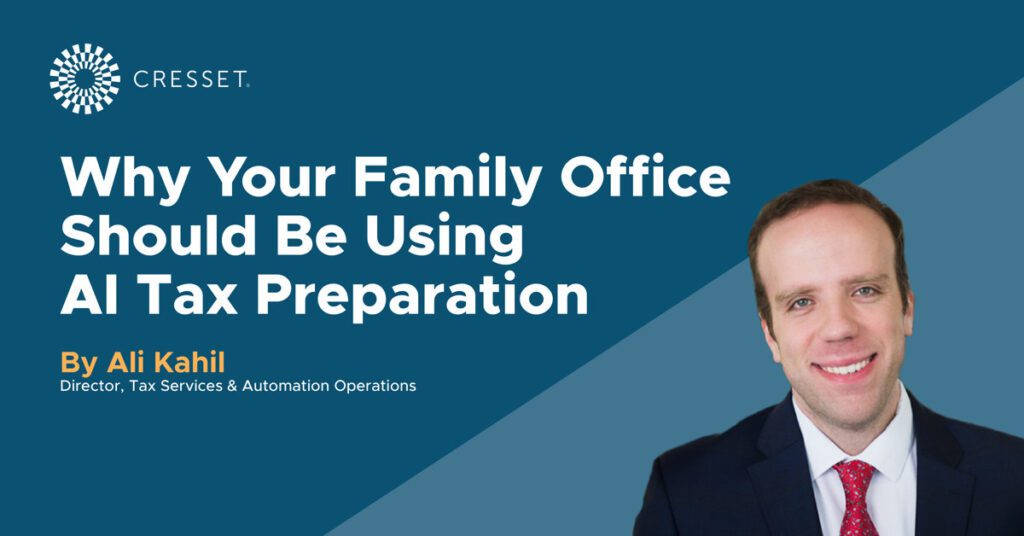
By Ali Kahil, Director, Tax Services & Automation Operations
Artificial intelligence is revolutionizing the traditional role of the family office, reshaping strategies, and enhancing efficiency to provide modern solutions to the complex needs of high-net-worth families. With these advancements, have you ever wondered if your family office is stuck in the Stone Age? Do you ever feel like you are doing more work than the tax professional who is tasked with helping you file your annual return? Here’s what you should look for to determine whether your financial advisor is ready for the next technological wave, the artificial intelligence productivity boom.
Is Your Family Office Technologically Up to Date?
The concept of a family office is nothing new. In fact, the origin of a family office dates all the way back to ancient Rome. While Moore’s law has exponentially increased the computing power of the microprocessor in the decades since the invention of the personal computer in 1971, the speed at which family offices are changing and adopting modern technologies still lag behind.
Ultra-High-Net-Worth Tax Planning: Questions to Ask Your Family Office
Wealth management tax planning is never thought of as something particularly exciting, yet it is a facet of daily life that is becoming increasingly difficult to overlook, especially for families with high-net-worth (HNW) or ultra-high-net-worth (UHNW). It is not always about how much you make, it is also about how much you get to keep, and the goal of tax planning is to maximize after-tax wealth. Asking the right questions of your family office can help you determine whether they are staying up with the latest advancements in technology. Here are three questions to help get that conversation started.
How do you ensure that all necessary tax documents across my investments are included when you prepare my taxes?
Families with significant complexities in their investments will often be burdened by the administration that arises at tax time. There may be K-1s missing, forgotten bank accounts, or other taxable items that should be included in an end-of-year return, but ultimately, are not. While it is not uncommon to find a family office with in-house tax professionals, it is unlikely to find a vertically integrated tax practice that recognizes the need to leverage technology in their work.
- What has been reported to the IRS?
- What are we still missing from the return?
- How does this affect the client?
How can AI be used in taxation?
At Cresset, our tax technology stack is built to identify any gaps in our clients’ returns from previous years. We have the capability to communicate with the backend systems of the IRS to provide us with a readout of the information reported to them. Why does this matter? As a result of leveraging the latest technology for tax compliance, we ask our clients for the information we need at the start of the filing process, to ensure a quality outcome for our families and in an effort to make the yearly tax burden nothing more than a minor checklist.
What are you doing to increase the accuracy of my tax return?
Gone are the days of waiting for tax documents to arrive in the mail. While these documents are now housed online, the issue remains on how the data reflected in these forms is analyzed and recorded within the tax return. The overwhelming majority of tax professionals today will still manually enter information within their tax software. The problem with this approach is that the error rate of manual data entry is high, the cost of paying someone to enter that data is higher, and the time spent entering the information would be better served working directly with families on more pressing matters like wealth management tax strategy.
The importance of utilizing automation in tax return preparation for high-net-worth individuals has never been more critical, as it can mitigate inaccuracies. At Cresset, our tax team has not entered a 1099 from our custodial partners in years and we are in the process of adopting the same approach with K-1s. Through robotic process automation, artificial intelligence, and leveraging optical character recognition, we are on the path to eliminating the need to manually enter data ever again.
Why Does Using AI for Tax Preparation Matter?
The value that a tax practitioner brings is not found in the annual tax compliance cycle, but the ability to offer actionable tax strategy to clients to optimize current and future opportunities that they may be currently evaluating.
Contact us to learn more about how automation technology can help simplify your complex tax needs.
